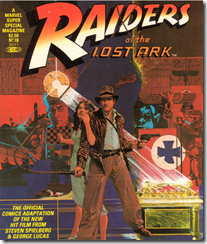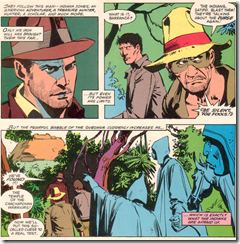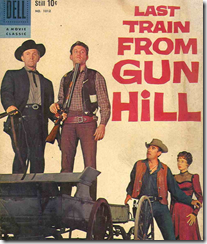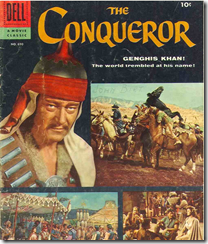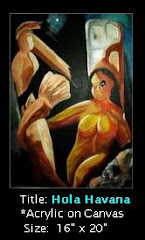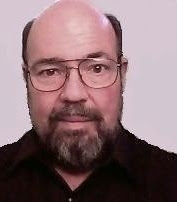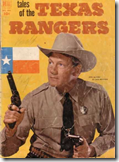
`Procedural’ cop shows are a staple of television, movies, and books these days . . . but prior to the mid-1940s they really didn’t exist.
Detective yarns were basically `whodunits’, and cops were usually portrayed as the clumsy foils of smarter private detectives like Sherlock Holmes, `Flash’ Casey, or Boston Blackie.
After World War II a number of directors decided to make more `realistic’ movies, depicting actual police cases, and often filmed on location. Movies like The Naked City (1948), T-Men (1947), and Border Incident (1949) were dubbed semi-documentaries by the critics, but found wide audience acceptance.
One such film, He Walked By Night (1948), featured a radio actor named Jack Webb as a crime lab technician.
Webb had played private detectives (Johnny Modero, Jeff Regan) and even done zany comedy (see You Really Don't Know Jack) – but the success of this procedural detective story inspired him to create the most famous cop show of them all - Dragnet.
Since then, procedural cop shows have ruled. A few of the hundreds of shows include:
Adam-12
CSI (Las Vegas, NY, Miami)
Criminal Minds
Dragnet
The FBI
Homicide
Highway Patrol
Law & Order (all flavors)
Naked City
NCIS
In 1950, an unusual melding of the new procedural cop show format, and the Western genre, produced one of the best detective radio shows of all time.
Tales Of The Texas Rangers starring Joel McCrea as Texas Ranger Jase Pearson ran only 2 years (although it was reincarnated as a Saturday Morning TV show for kids in the late 1950s), but it is remembered today as being the `Dragnet’ of Westerns.
Dramatizing actual cases from the files of the Texas Rangers – and set in contemporary Texas of the 1930s and 1940s – these 30 minute shows have an unusual degree of authenticity to them.
Helped, no doubt, by the technical consultant for the show, Captain Manuel T. "Lone Wolf" Gonzaullas, a Ranger of more than 30 years.
Despite being set in `modern times’, Joel McCrea often had occasion to mount his faithful horse, Charcoal, in pursuit of a fleeing fugitive.
At the end of each show – just like in Dragnet – the conviction and jail sentence of the guilty is recited, followed by a bit of Texas Ranger Lore.
This is a `Western’ that even people who don’t think they like Westerns will probably enjoy. Of course, if you don’t like westerns and procedural police dramas, you might want to give it a pass.
Individual episodes of Tales of the Texas Rangers are available on several OTR sites.
For those who can handle Real Audio files , the OTR.Network Library has 70 episodes available HERE.
Old Radio World has roughly 90 episodes in MP3 format available HERE
And to download a full CD of Shows, the Internet Archive has a 600 megabyte zipped collection HERE.
Try an episode or two on for size, and if you like the show, download the entire CD.
Joel McCrea was one of the biggest stars of the 1930s and 1940s, having started out as an extra and a stuntman in the late 1920s at MGM. He moved to RKO in the early 30s and appeared in such films as Bird of Paradise and The Most Dangerous Game (see Four Variations On A Theme).
He could play light comedy, action adventure, or drama but it is perhaps the Western for which he is best remembered. In the 1930s he starred in Wells Fargo (1937) and Cecil B. DeMille's Union Pacific (1939).
In the 1940s, he alternated between Westerns, light romantic comedies (Sullivan's Travels (1941), and The Palm Beach Story (1942)), and Hitchcock thrillers.
In 1946, after the success of The Virginian, McCrea pretty much stuck with Westerns. Although he would continue to act in movies (sparingly) until the mid 1970s, McCrea’s last `big’ westerns was In Ride the High Country (1962).
McCrea passed away in 1990, leaving behind a legacy of over 90 films, a short-lived 1959 TV series (Wichita Town), and his radio series for the world to enjoy.





